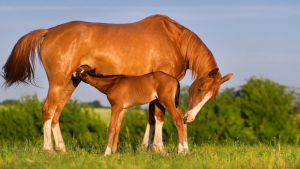Equine
How Does the Newborn Establish its Gut Flora?
 Newborns acquire their gastrointestinal microflora, also known as gut microbiota, during and after birth. During passage through the birth canal, infants come into contact with maternal microflora, which initially colonizes their gastrointestinal tract. The lactic acid producing bacteria are a major component of the vaginal mucosa, these bacteria maintain an acidic environment which prevents the growth of pathogenic bacteria. Lactobacillus Reuteri is critical to early GI flora development and important as a preventative to early foal viral bacterial disease through the early development of the immune system.
Newborns acquire their gastrointestinal microflora, also known as gut microbiota, during and after birth. During passage through the birth canal, infants come into contact with maternal microflora, which initially colonizes their gastrointestinal tract. The lactic acid producing bacteria are a major component of the vaginal mucosa, these bacteria maintain an acidic environment which prevents the growth of pathogenic bacteria. Lactobacillus Reuteri is critical to early GI flora development and important as a preventative to early foal viral bacterial disease through the early development of the immune system.
In addition to passage through the birth canal, suckling plays a crucial role in further shaping the infant’s gut microbiota. Mare’s milk contains various beneficial components, including probiotics, prebiotics (Lactobacillus Reuteri) and antibodies, which support the growth of a healthy gastrointestinal tract, and immune system. Lactobacillus Reuteri plays a role as it is a component of the flora residing on the mucosal of the teat canal, as the foal suckles the mare it obtains the Lactobacillus reuteri. Over time, as the foal is exposed to the environment and starts consuming solid foods, their gut microbiota diversifies and becomes more complex.
The early establishment of a balanced and diverse gut microbiota is important for the infant’s immune system development and overall health. Providing the mare with Lactobacillus Reuteri before foaling and the foal with Lactobacillus Reuteri shortly after birth reduces the chances of neonatal foal diseases and diarrheas. We have two different protocols for giving Equiotic Foal & Mare to the mare during gestation and the foal after birth. These protocols provide an easy way to supplement with Lactobacillus reuteri.
